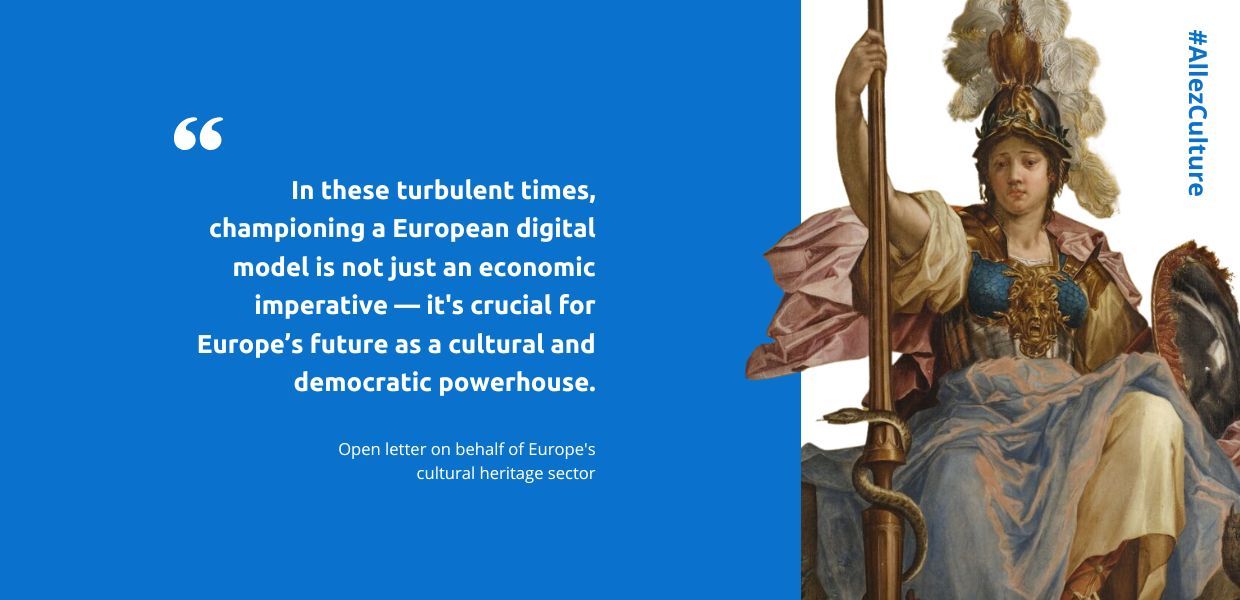OPEN LETTER TO THE EXECUTIVE VICE-PRESIDENT FOR TECH SOVEREIGNTY, SECURITY AND DEMOCRACY OF THE EUROPEAN COMMISSION, HENNA VIRKKUNEN
ON BEHALF OF EUROPE’S CULTURAL HERITAGE SECTOR
Dear Executive Vice-President Virkkunen,
Our culture and history are the foundation of our European way of life, as President Ursula von der Leyen rightly acknowledges in the Commission’s 2024–2029 political guidelines. Beyond its immense intrinsic value, our cultural and creative capital fuels innovation, enhances competitiveness and can be a strategic asset for Europe’s global leadership in a shifting digital landscape. As the European Commission and the Member States finalise the Digital Europe Programme (DEP) Work Plan 2025-2027, we, the undersigned, urge you to prioritise its only earmarked cultural investment: the common European data space for cultural heritage. Currently, underfunding risks weakening its potential to drive a value-based, competitive and collaborative digital future in Europe.
Over the past months, we, along with other leading cultural heritage institutions and networks —representing over 3,000 organisations— have expressed our concerns to the Commission regarding the significant underfunding of the data space and the complete lack of funding for supporting projects in the Work Plan. Ministers of Culture and Member States’ representatives in the DEP Coordination Committee have also raised this issue, yet it remains unresolved in the latest proposal text. As the only cultural initiative within Digital Europe, this comes at a critical moment when the EU should be increasing, not decreasing, its investment in culture and innovation.
Culture is the space where we negotiate how we live. We fully support your mission to harness Europe’s strengths to secure technological sovereignty. As tech giants scale back on diversity, inclusion, and equal access to reliable and balanced information, we uphold Europe’s cultural heritage as both a reflection of our history and values and a path for shaping our future on our own terms. In a volatile digital landscape, fraught with global political challenges, Europe must take a stand and the time to act is now. We must build innovative, competitive data infrastructures and services, rooted in democratic values, in human rights and for the public interest. The data space is a unique opportunity to realise this ambition.
The foundation of Europe’s competitiveness lies in its people. As the Competitiveness Compass shows, Europe is home to world-class scientists and vibrant cultural and creative industries. Digital culture fuels these sectors through the reuse of heritage data — from education and research, to entertainment and tourism, where 40% of all travel is motivated by culture, as well as other industries. This presents the EU with an opportunity to lead in a sector of significant competitive advantage — culture and creativity — while fostering innovation both within and across sectors.
The data space for cultural heritage —Europe’s most advanced data space to date— can serve as a blueprint for less mature data spaces. Over the past decade, with the vital support of the EU and Member States, our sector has developed standards and frameworks based on open, interoperable and democratic principles. We have built a rich, high-quality and multilingual collection of over 59 million digitised objects from cultural institutions across Europe and a vibrant global network of professionals with the potential to further expand and re-use this data offer in the future. This forms the foundation of the data space, ready to scale its impact and drive experimentation with advanced technologies like AI — one that is both cutting-edge and value-based. With the data space, cultural heritage stands at the doorstep of transformative change — yet, investment must match the scale of this ambition.
We applaud the European Commission President’s clear determination to make it easier for people —especially younger generations— to access and benefit from Europe’s rich cultural heritage. The data space holds immense potential to equip Europe’s next generation of citizens with critical thinking, which is vital in today’s fight against misinformation and central to our joint work on safeguarding democracy and security.
Therefore, we, a pan-European community of 40 organisations and networks, call on the European Commission to increase funding for the data space to ensure it thrives, benefiting the heritage sector, citizens and businesses across Europe. In these turbulent times, championing a European digital model is not just an economic imperative — it is crucial for Europe’s future as a cultural and democratic powerhouse.
We rely on your support to ensure the sustainability and growth of the data space as a critical step in fulfilling this commitment.
SIGNATORIES (In alphabetical order)
4CH - Competence Centre for the Conservation of Cultural Heritage
AI4LAM - Artificial Intelligence in Libraries, Archives, and Museums
AIT Angewandte Informationstechnik Forschungsgesellschaft mbH
AIT Austrian Institute of Technology
APEF - Archives Portal Europe Foundation
Austrian National Library
Biblioteca de Catalunya
Bibliothèque nationale de France - National Library of France
Catalònica
Creative Commons
Deutsche Digitale Bibliothek (DDB)
DFF – Deutsches Filminstitut & Filmmuseum
Europa Nostra
Europeana Aggregators’ Forum
Europeana Foundation
Europeana Network Association
European Fashion Heritage Association
German National Library - Deutsche Nationalbibliothek
KB - National Library of the Netherlands
Leiden University Libraries
Michael Culture Association
Ministère de la Culture de France
Musiikkiarkisto – Music Archive Finland
National Archives of Finland
National Library of Lithuania
National Library of Serbia
National Library of the Czech Republic
Network of European Museum Organisations - NEMO
Open Future
Poznań Supercomputing and Networking Center
Riksarkivet (National Archives of Sweden)
Slovenian National E-content Aggregator (National and University Library, Ljubljana, Slovenia)
State Archives of Belgium
Statens Museum for Kunst - National Gallery of Denmark
Stiftung Preußischer Kulturbesitz (SPK) - Prussian Cultural Heritage Foundation
The Conference of European National Librarians (CENL)
The National Library of Finland
The Netherlands Institute for Sound & Vision
Time Machine Organisation (TMO)
TU Delft Library
Download the letter sent to Executive Vice-president for Tech Sovereignty, Security and Democracy of the European Commission, Henna Virkkunen.

